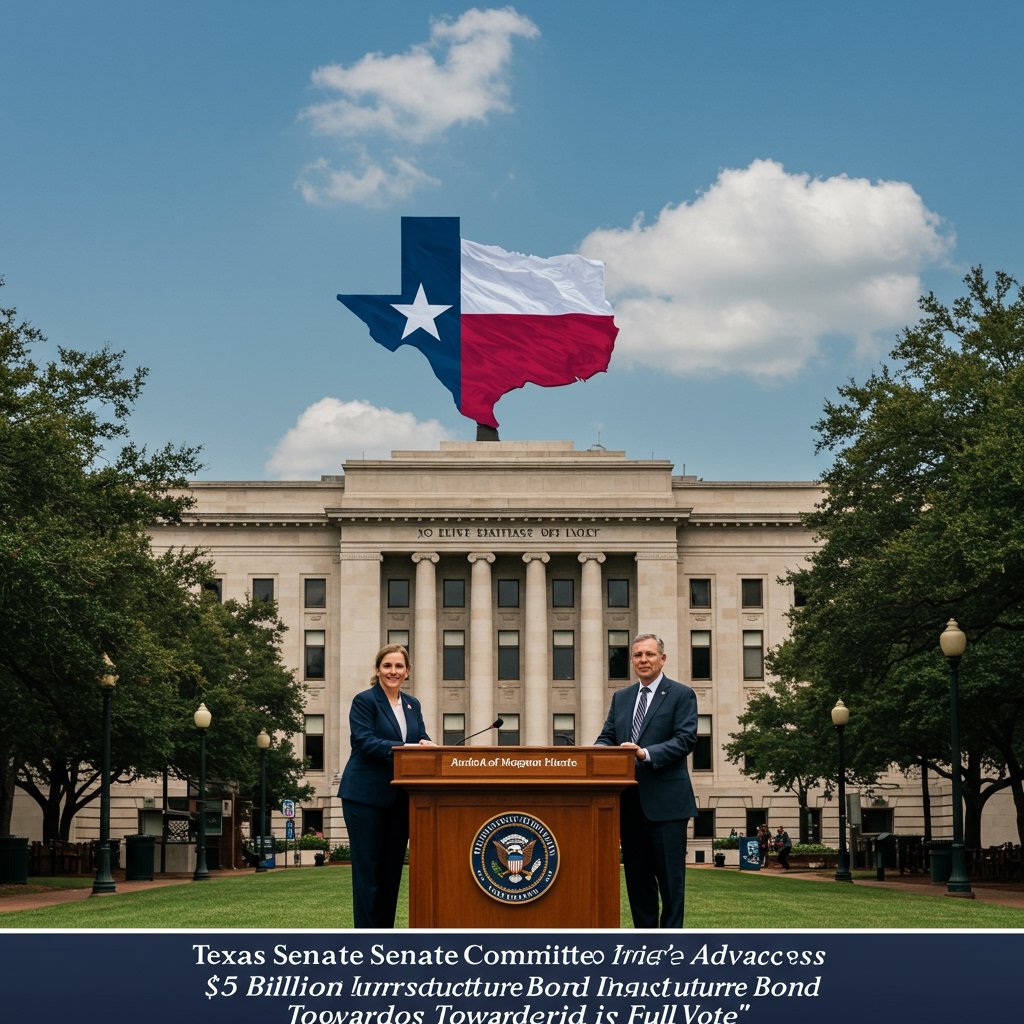Texas Senate Committee Advances $5 Billion Infrastructure Bond Towards Full Vote
A pivotal legislative development occurred today in the Texas Legislature as a key committee successfully advanced a substantial bond proposal designated for critical state infrastructure projects. This measure, formally introduced as Senate Bill 12 (SB 12), proposes a significant investment of $5 billion aimed at addressing pressing infrastructure needs across the rapidly growing state. The advancement of SB 12 through committee is a crucial step, signaling legislative momentum for a plan proponents argue is essential for supporting Texas’ future.
Bill Details and Allocation
SB 12, championed by proponents as a vital step towards securing Texas’ future prosperity, outlines specific areas targeted for this substantial funding. The $5 billion package is primarily allocated to three core infrastructure sectors: improvements to the state’s extensive highway network, expansion of broadband internet access, particularly in underserved rural communities, and crucial upgrades to water infrastructure systems across the state.
The proposed distribution reflects key priorities identified by state leaders and infrastructure experts. While the precise breakdown of funds per sector will be detailed within the bill’s text, the emphasis is clearly placed on areas deemed essential for supporting Texas’ continued economic expansion and accommodating its burgeoning population. Funding for highways is intended to alleviate congestion on critical transportation corridors that are increasingly strained by freight traffic and commuter volume. Improving road infrastructure supports the state’s vast logistics network, facilitating commerce and reducing travel times for businesses and residents alike. Enhanced highway capacity and maintenance are vital for safety and efficiency in a state as large and economically active as Texas.
The allocation for broadband aims to bridge the digital divide that persists between urban centers and many rural areas. Providing reliable high-speed internet access is no longer a luxury but a fundamental necessity for modern life. Expanded broadband supports remote work opportunities, enhances educational access through online learning, enables telehealth services in areas with limited medical facilities, and provides critical tools for agricultural producers and small businesses seeking to compete in a global marketplace. The investment stipulated in SB 12 seeks to ensure that more Texans have the connectivity required to participate fully in the 21st-century economy.
Investments in water infrastructure are designed to address issues ranging from aging pipelines and treatment facilities to securing future water supplies and improving resilience against drought conditions, which are a recurring concern in Texas. Ensuring a reliable and safe water supply is fundamental for public health, supports agricultural irrigation vital to the state’s economy, and is necessary for industrial processes. Upgrading water systems through this bond funding can improve efficiency, reduce water loss, and enhance the capacity of communities to manage their water resources effectively in the face of growing demand and changing climate patterns.
The Need for Investment
The urgency behind this significant infrastructure proposal is underscored by Texas’ unprecedented growth. The state has experienced substantial population increases and robust economic activity over recent years, placing immense strain on existing infrastructure. Roads are becoming more congested, demand for water is rising significantly, and the necessity of reliable high-speed internet access for all citizens and businesses is more evident than ever before. This growth trajectory, while a sign of economic vitality, requires proactive and substantial investment in foundational public works to be sustainable.
Proponents argue that without substantial investment, Texas risks hindering its own progress and competitiveness. State Senator John Doe, a vocal supporter of the measure, articulated this perspective compellingly during discussions surrounding the bill. He stated directly that the proposed $5 billion bond is “essential for supporting Texas’ rapid growth and economic development.” Senator Doe emphasized that investing in these fundamental areas is not merely about building physical structures; it is about laying the groundwork for continued prosperity, attracting new businesses, fostering the growth of existing industries, creating well-paying construction and maintenance jobs, and ultimately improving the quality of life for Texans in both sprawling urban centers and vast rural communities. He highlighted the long-term economic benefits and the necessity of proactive infrastructure planning rather than reactive fixes.
Funding infrastructure through bonds allows the state to undertake multiple large-scale projects concurrently, addressing needs more quickly than relying solely on annual state appropriations might allow. This approach is seen by supporters as a necessary and effective way to keep pace with the state’s dynamic growth trajectory and address accumulated infrastructure deficits. The bond mechanism provides a means to finance significant capital projects over a longer repayment period, distributing the cost over the lifespan of the assets being built or improved.
Committee Action Today
The advancement of SB 12 today by a key committee within the Texas Legislature marks a significant milestone in the legislative process. While the specific committee name wasn’t provided in the initial report, its action signifies that the proposal has undergone initial scrutiny, debate, and received sufficient support from committee members to proceed to the next stage. Committee hearings typically involve detailed presentations from state agencies responsible for highways, broadband development, and water resources, as well as testimony from stakeholders representing various industries, local governments, and the public, allowing for a thorough examination of the bill’s merits, proposed expenditures, and potential impacts. The successful vote today indicates that the bill has cleared its first major legislative hurdle and garnered necessary momentum early in the session.
The committee’s decision reflects a consensus among its members regarding the critical need for this investment and the suitability of the bond proposal as a funding mechanism to address those needs efficiently. This step is often seen as a strong indicator of the bill’s chances on the chamber floor, as committees play a vital gatekeeping role in the legislative process. Passage out of committee demonstrates that the bill has foundational support among a dedicated group of lawmakers who have studied the proposal in depth.
Next Steps in the Legislative Process
With the key committee’s approval secured today, SB 12 is now poised to move to the full Texas Senate floor for consideration by the entire chamber. This is the next crucial stage in the legislative journey and represents a significant test for the proposal. The bill is explicitly scheduled for a vote by the full Senate membership next week.
On the Senate floor, SB 12 will be subject to further debate among all senators. Lawmakers will have the opportunity to discuss the details of the funding allocations, the rationale behind the bond mechanism, and the projected impacts of the infrastructure projects. Amendments to the bill may also be proposed and debated at this stage. Following deliberation, the Senate will hold a final vote. If SB 12 passes the Senate, it would then need to proceed to the Texas House of Representatives for a similar process of committee review and full chamber vote before potentially being sent to the Governor’s desk for signature into law. The legislative process requires passage by both chambers, and while the committee action is positive, the bill still faces significant hurdles. The upcoming vote on the full Senate floor next week will be closely watched by state agencies overseeing infrastructure development, industry groups involved in construction and technology, local governments anticipating project funding, and citizens across Texas who stand to benefit from or be impacted by the proposed investments in highways, broadband, and water infrastructure. The support voiced by figures like State Senator John Doe will be crucial as the bill navigates further scrutiny and debate on the Senate floor.
The legislative process ensures that proposals like SB 12 are thoroughly reviewed from multiple perspectives before potentially becoming law, but the committee’s action today clearly signals a legislative priority and a recognition among a key group of lawmakers of the urgent need to invest strategically in the state’s foundational infrastructure to accommodate its future.






